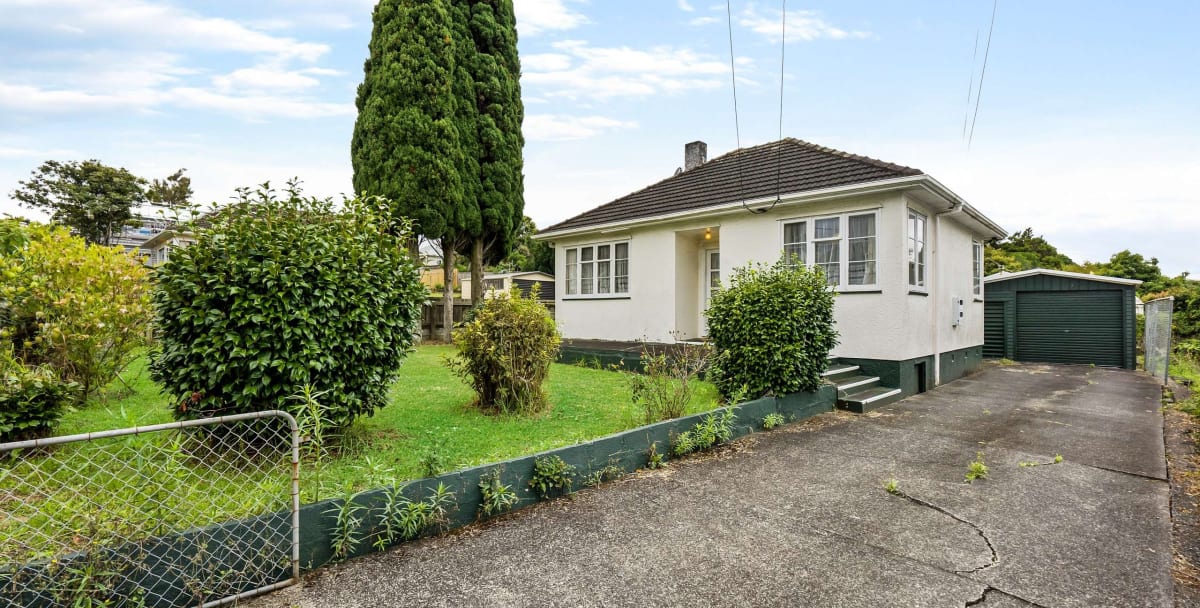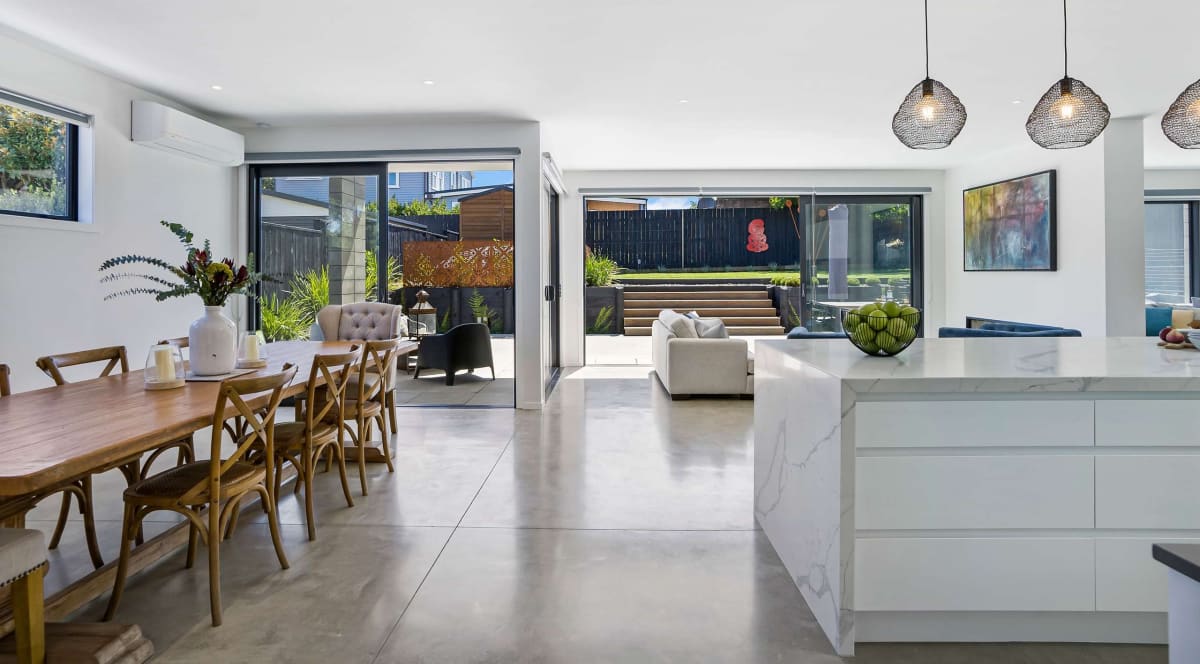A Tale of One House, Two Generations and $1.59 Million
Housing
Make no mistake, it’s never been easy to purchase a first home. But last night at a crowded real estate auction in Royal Oak, with investors seeming spooked by new tax rules, there were glimmers of hope for young buyers
Claudette Wilschefski started saving soon after she left school. She saved for 15 years. “In my early 20s I had a bank manager reach across the desk and pat my hand and say, ‘just wait until you get married and your husband will take care of this for you’.”
But she persisted. And one day she was out for a ride, on her pushbike, and turned down a small street with three ‘for sale’ signs. “And I thought, this is the sort of street I want to live in.”
So she went to the real estate agent, told her how much she’d saved and asked what she could buy. “Nothing,” the agent sniffed.

But there was one small house owned by an older lady in her 80s. “So I put my best offer in and apologised at the bottom that it was the most I could afford. And she accepted it.”
Claudette put down the mandatory 20 percent deposit on the $109,000 purchase price. That was 1992, and she was 34 years old.
She was paying double-digit interest rates, on a tiny two-bedroom cottage on the sunny slopes above the perpetually “up and coming” community of Onehunga.
So make no mistake, she says, it’s never been easy to buy a first home.
“I can tell you the sensation I had when I first bought it. I got home from work that first night, and I put the key in the door, and as I was opening it I was thinking, ‘this is my house’. And I walked around the whole house – all two bedrooms of it!
“So when people in their 20s are saying, I can’t afford to get into the property market, back then neither could I.”
* * *
It’s 2021 now, and Claudette has put that little home on the market. She’s moved in with her partner; they hope to build their own place together down south in Patumahoe.
We’re friends with Claudette, so we take an interest. And it’s a vested interest: we live just across the road and one down from her corner section. We want to know whether the house is going to be bought as a “do-up” by some bright-eyed, hard-working young family, or bought, bulldozed and replaced with three or four townhouses by some bright-eyed, hard-working young developer.
The first open home, I stroll over in shorts and jandals with my six-year-old son. I tick the “nosy neighbour” category on the registration form, and look around. Ray White have got a sale strategy here, I think. They’ve left a pan sitting on the hob; a pair of Claudette’s jandals by the front door. The message they’re sending? Don’t even bother about the house, the 511 square metres of Auckland land underneath is all that matters.

The house hasn’t had a reno in the 28 years that Claudette had owned it, and the estate agents know it’s not going to win hearts, just minds. The marketing material shouts: “Ideal to do up or develop!”
On Saturdays and Sundays, we make ourselves black coffees and watch as the junior Ray White agents in their dark blue suits show off Claudette’s house to potential buyers. There are the couples, some with small children. And there are the middle-aged tyre-kickers in more expensive cars who, rightly or wrongly, we assume to be investors. At least one car looks like it should be worth more than the house.
But as I say, it’s 2021 now. Nothing is worth more than a plot of Auckland land.
* * *
It’s six o’clock on Tuesday evening. The auction room upstairs at the Royal Oak Mall is chocka. There are about 150 people. Claudette gives me a wave, but there are no seats near her and her partner, so I squeeze into a corner at the back.
At the back is where the grizzled older folk are. The experienced buyers, with auction strategies. From the back, they can see the room, and see who’s in the game.
But it’s not a game for the young couple next to me. Notepad in hand, I introduce myself.
This is just the fourth or fifth auction Richard McNamara and his partner have been to. They’ve turned up to some knowing the maximum they were able to pay – and walked straight out the door again when the houses they had an eye on soared out of reach on the opening bid. They like Onehunga, but have got a soft spot for Morningside too.
I pull out my black-and-white photocopy of the auction running order, and Richard points to the seventh of the eight houses listed on the page. That’s the one they’ve got their eye on. A lot of work, a real do-up, but perhaps that might deter other bidders, they hope.
It’s Claudette’s house.
* * *
If this is the red-hot house market, it feels like cool runnings. Ray White’s chief auctioneer John Bowring isn’t rushing proceedings. “Sorry about the croaky voice,” he says, “but when you’re calling about 45 auctions a week, it’s going to happen.”
Bidding on the first house, a nicely restored three-bedroom 1920s cottage down on picturesque Cardwell St, peters out at $1.55 million. Claudette waves across the room at someone she knows, and almost finds herself an unwitting buyer. But it is passed in.
Bidding on a bigger house down on Arthur St reaches $1.675m without making its reserve. The estate agents confer with the leading bidder and her partner out back and five minutes later, she increases her bid just a notch to $1.7m – and it’s sold.
A two-bedroom cottage on Athens Rd goes to a young couple for $1.065m. A big, ugly 1980s house on Alfred St goes for $1.3m in a bidding war between two couples. Namata Rd goes for $1.48m. And the highlight of the auction, a restored villa on Grey St, brings the room to life. There are about 20 bidders – but the serious ones are all blokes at the back of the room. The three all stay quiet early on, then barrel in aggressively at the end. $2.86m

Fiona Grove is in tears, as her family hug her. This villa was her “dream home”, that she had spent four years renovating and restoring. It’s beautiful, and she just wants to believe that its new owner will love it as much as she does.
A partner in a small construction company, JD Construction Co Ltd, she had felt confident that her sale prospects would not be depressed by the new tax rules penalising investors. If she hadn’t got the price she wanted, she wouldn’t have sold.
This house was never likely to be bought for someone to rent out or replace with townhouses; restored and landscaped, it was always going to fetch a premium as a family home.
“When I bought the villa it was completely original and had been in one family since 1910,” explains Fiona. “The owner before me was in her 90s when she passed away. She left it to her three nieces and nephews; I knew one of them and I promised them I’d look after the house.
“I felt really emotionally connected to it. It was one of my ambitions to renovate a villa, really well, so I’d be really disappointed if someone knocked it down. I’d be devastated, actually!”

* * *
The room empties out. Close on 100 people had stayed to see the Grey St villa go. And then it’s time for Claudette’s house to go under the hammer. Richard McNamara and his partner, who had been standing at the back of the crowded auction room, now take seats – right next to Claudette. They don’t know she’s the vendor; she doesn’t know they’re potential buyers.
There is a pause after the auctioneer opens proceedings. A long pause. And still, it continues. Finally, a woman in a white sweatshirt and striped trackpants raises her hand. One million dollars. And that’s it. Richard and his partner don’t bid. Nobody else bids.
Eventually, Bowring resorts to that most despised of auctioneer’s tactics: a vendor’s bid. He nominates $1.1m, forcing trackpants bidder to push up to $1.2m to stay in the game. “That’s the first vendor’s bid I’ve put on in about 13 months,” he exclaims. It’s a sign of how heated the market has been over the past year. Auctions just don’t stall. There’s always a bid.
“I think last week that property would have had an investor buying it and putting two townhouses on it, but this week there’s no investors in the room.”
– Richard McNamara
Until now – and this is one of three subtle signs that the market is responding to the levers pulled last week by the Prime Minister and Finance Minister.
First, the investors have disappeared. It may be just temporary, as they assess how the new tax rules affect them, but estate agents nationwide have reported their diminished numbers at open homes and auctions.
Secondly, there was often stalled bidding forcing such old-fashioned tactics as, on this one occasion, the auctioneer lodging a vendor’s bid.
And thirdly, two of the eight houses were passed in at this auction – and real estate agencies are reporting the same emerging trend around the country.
Yesterday, TradeMe reported that vendor’s asking prices hit an all-time high of $784,450 last month. Realestate.co.nz publishes its monthly report tomorrow, and that is likely to show a similar upward trend in sales prices. But neither of these sets of numbers factors in last week’s government housing package, and the extent to which it has persuaded investors to step back from the market for at least a while.
Buoyed by the big attendance and strong prices recorded at the evening’s auction, Ray White Royal Oak director Martin Honey remains bullish. He agrees investors are stepping back and prices will soften – but not in Royal Oak and Onehunga, he insists. In the suburbs in which he operates, owner-occupier purchasers will ensure prices remain high.
* * *
Barfoot & Thompson managing director Peter Thompson has all the numbers at his fingertips. It probably goes with the job, in real estate sales. They auctioned 87 properties at their Highbrook agency on Tuesday this week; there was good bidding on most auctions and 42 sold under the hammer. There were only six that had no bids.
At their Shortland St agency, they auction 32 properties the same day, and 17 sold under the hammer – but with fewer than a fifth garnering no bids. “And last night at Long Bay, they did five out of five under the hammer.”
“As soon as the announcement came out, there was a definite and immediate slowdown, which there always is,” he said. “But after a couple of days, the crowds started to come back.
“The vendors are going to have to be more realistic and decide whether they want to sell or not. There are still good buyers attending, a little bit of the investor, a little bit of the first home buyer.”
Instead of selling 80 percent under the hammer, Thompson estimates they’re closer to 55-60 percent – but he says those numbers will look better as the remaining post-auction negotiations firm up with signatures on dotted lines. “It’s still early days.”
Thompson is concerned the government’s tax changes are hitting the wrong people. “They’re hitting the ma and pa investor, buying investment properties for their retirement. Yes, something had to be done, I’m the first to put my hand up and say prices are going up. But prices won’t fall till at least May or June, for the recognised figures. In fact, it looks like it’s going to be a record March, and April will have a flow-on effect from the sales made towards the end of March.”
He said economists failed to appreciate the three to four week delays in settling sales. After a month, the market would look to be on a more even keel. “There’s always people having to buy, there’s always people having to sell, and real estate continues. It’s just going to be a different type of investor, who is going to have to be long-term. It’s only speculators who aren’t long-term. But the bright line test is a capital gains tax, don’t tell me it’s not.”
* * *
With bidding on Claudette’s home now stalled at $1.2m, well below the reserve, the back-room negotiations begin. And I chat with Richard in the auction room, which is now nearly empty.
“Certainly we were competing with investors at some of the other auctions,” he says. “I think last week that property would have had an investor buying it and putting two townhouses on it, but this week there are no investors in the room. I think it’s more buyers supported by parents, that kind of thing.”
He and his partner had decided that the property simply required too much work, for them to bid. But unlike previous auctions, they’re not disheartened at walking away empty-handed. For the first time, they have seen younger people like them bidding and winning.
“This gives us more confidence, I think, to try and get in while there’s uncertainty in the market,” Richard says. “So we’re here tonight, and we’re going to see a couple more auctions in the next few weeks. And hopefully we can pick something up while there is a bit of a lull.”
And now, the estate agents come out to explain what’s happened. The lone bidder was keen; she was willing to raise her offer. So Claudette had pulled the property from the auction then, in that back room, had negotiated a sale. $1.59m – even more than the real estate agents had dared hope.
It’s a decent return on $109,000, over 29 years – just a tad shy of 10 percent gain per annum.
Claudette emerges and I give her a hug. “I’m ecstatic,” she tells me.
And the new owner? Well, it’s understood she’s a developer who’s planning to put two townhouses on the site.
Plus ça change …
